Key takeaways:
- Creating a skill list enhances self-awareness and reveals transferable skills that students can present to potential employers.
- Both hard skills (technical abilities) and soft skills (communication, teamwork) are crucial for demonstrating overall capabilities.
- Regularly updating and organizing skill listings improves clarity and relevance in competitive job markets.
- Specific examples of skills in action can significantly strengthen an application and make a lasting impression on employers.
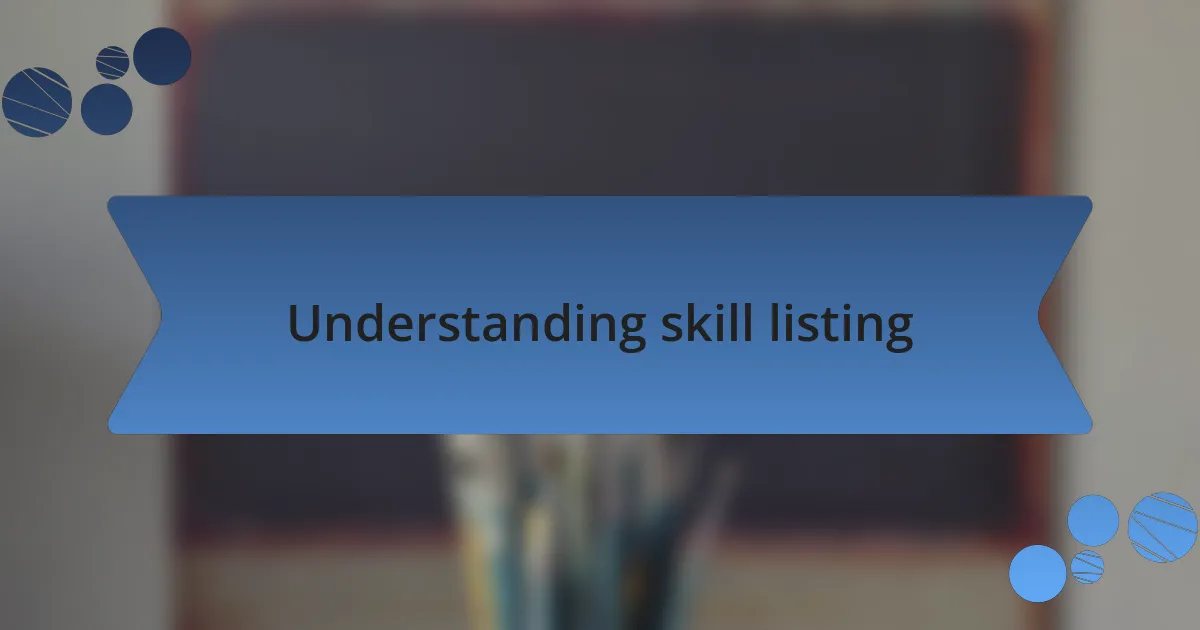
Understanding skill listing
Understanding skill listing is crucial for students aiming to market themselves effectively to potential employers. When I first created my own skill list, I was surprised to discover just how much I had to offer. It felt empowering to see my experiences laid out and to understand that every part-time job or volunteer position had equipped me with transferable skills.
Have you ever thought about what makes a skill truly valuable? I used to think that only technical skills mattered, but I learned that soft skills—like communication and teamwork—can be just as essential. During a group project, I realized how much I relied on my ability to collaborate and listen to my peers, which ultimately enriched our output and made the experience more enjoyable for everyone.
Creating a skill list isn’t just about listing what you can do; it’s about framing those skills in a way that resonates with employers. I remember revisiting my skill list before an interview and pinpointing my adaptability. By sharing a story about how I handled unexpected challenges in a past role, I was able to demonstrate not just what I could do, but also how I approached problems. This made the conversation feel more authentic and relatable.
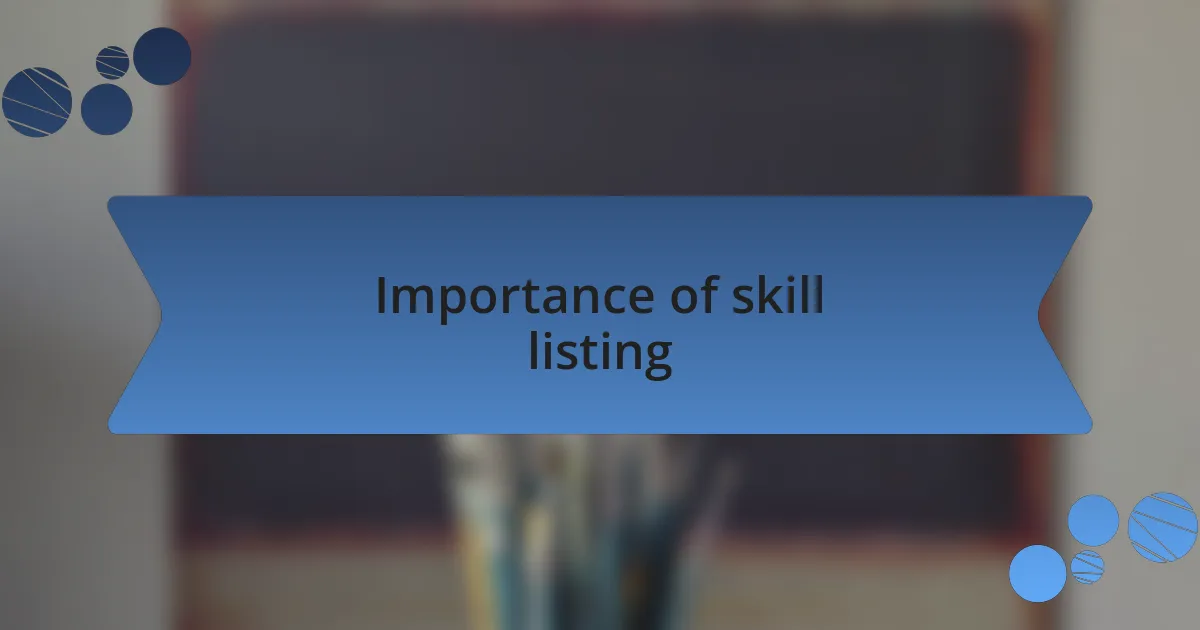
Importance of skill listing
Listing skills is essential because it allows students to identify their strengths and areas for growth. Reflecting on my own journey, I recall how developing a skill list revealed unexpected abilities within me. For instance, I never considered myself a leader until I categorized my experiences and realized I had led small teams during various projects. This recognition gave me the confidence to pursue leadership opportunities.
Furthermore, having a well-articulated skill list can help students tailor their resumes and applications to stand out in a competitive job market. I vividly remember when I customized my application for a summer internship, emphasizing my time management and organization skills. The recruiter later praised my attention to detail, which I believe stemmed from being intentional about presenting those skills clearly.
Ultimately, effective skill listing fosters self-awareness and highlights unique qualities that students can offer to potential employers. It encourages a mindset shift; instead of merely hoping to fit the mold of a job description, I began focusing on how my individual experiences and skills could bring value to a team. Isn’t it fascinating to see how self-reflection can pave the way for new career opportunities?
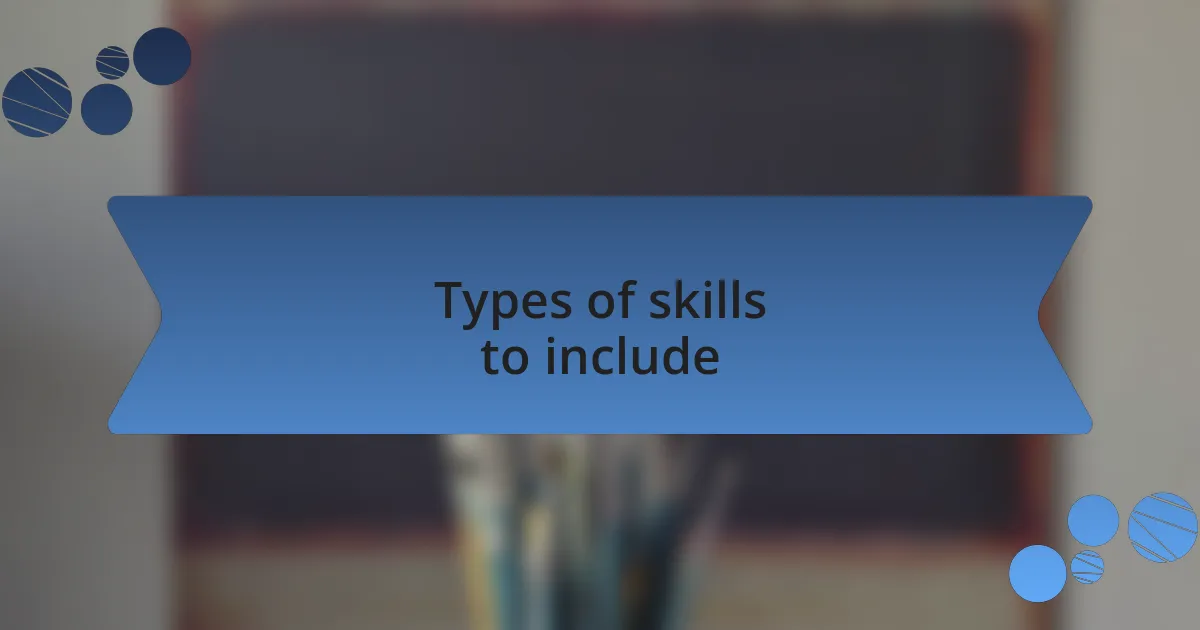
Types of skills to include
When thinking about the types of skills to include, it’s essential to cover both hard and soft skills. Hard skills, such as proficiency in software programs or technical skills relevant to your field, demonstrate your ability to perform specific tasks. I remember when I listed my graphic design software skills on my resume; it significantly enhanced my appeal to potential employers who were looking for candidates with technical know-how.
On the other hand, soft skills should not be overlooked. Qualities like communication, teamwork, and adaptability are highly valued by employers across various industries. I once took a moment to highlight my ability to collaborate effectively within diverse groups during group projects. Reflecting on my teamwork experiences not only illustrated my ability to get along with others but also showcased my willingness to listen and adapt—traits that have opened many doors for me.
Lastly, don’t shy away from including unique or niche skills that set you apart. Whether it’s knowledge of a second language or experience with social media marketing, these can be conversation starters during interviews. I recall mentioning my passion for blogging in an interview, and it immediately shifted the conversation into a dynamic discussion about content creation strategies. Isn’t it interesting how the skills that seem minor at first can become major talking points in your professional journey?
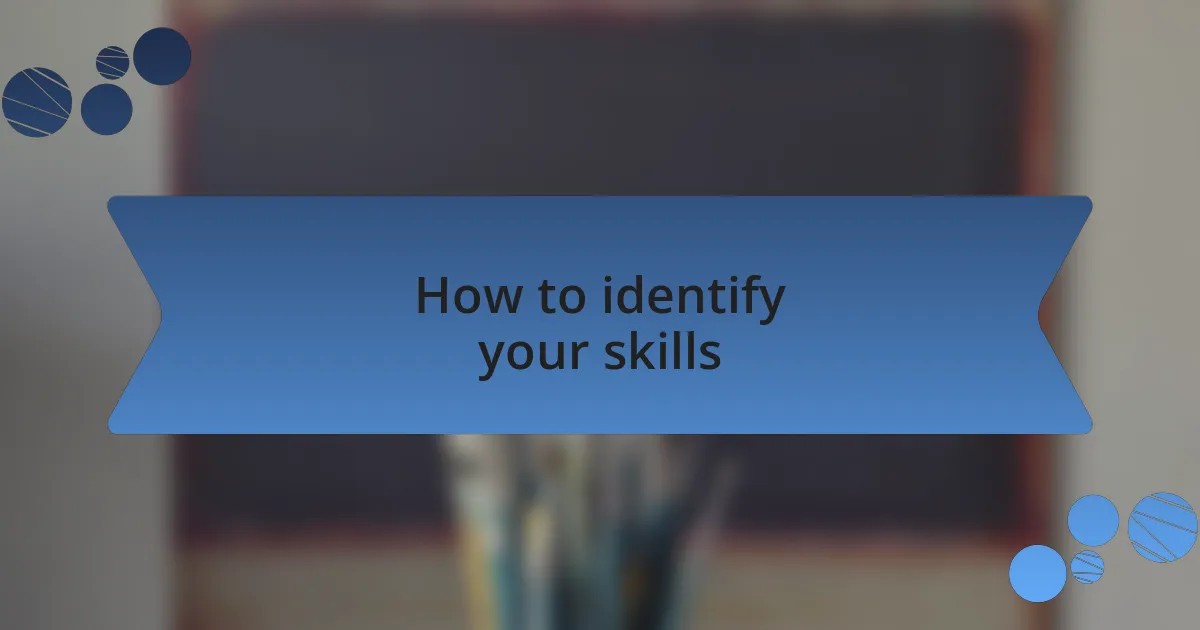
How to identify your skills
Identifying your skills can feel daunting, but it starts with a simple reflection on your experiences. I often encourage students to think back on moments when they felt proud of their contributions—what tasks were you handling? For instance, during a part-time job in retail, I discovered my knack for problem-solving when I successfully resolved a customer complaint. Those little victories were my indicators of specific strengths worth highlighting.
Another approach is to solicit feedback from peers or mentors. Sometimes, we overlook our own skills because they come so naturally to us. I remember asking a close friend what she thought my strengths were, and she pointed out my ability to remain calm under pressure. That insight helped me realize how valuable that soft skill was, particularly in job interviews where employers seek composed candidates. Have you considered how others perceive your abilities?
Lastly, I find it helpful to list down everything you can think of, from daily tasks to unique accomplishments. Take a moment to jot down skills you’ve acquired, big and small. When I compiled a list of everything I had learned—from organizing events to managing social media accounts—I was surprised by the range and depth of my abilities. This exercise not only boosts confidence but also clarifies what you truly offer to potential employers. Why not give it a try? You might uncover skills you didn’t even know you had!
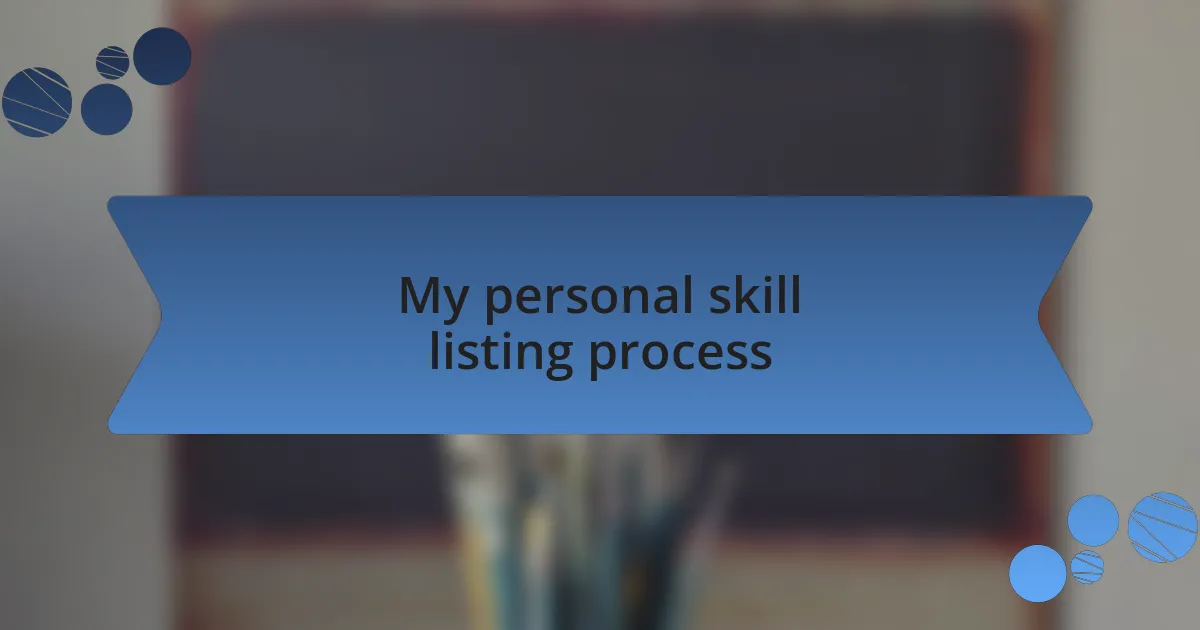
My personal skill listing process
When it comes to my personal skill listing process, I start by diving deep into my past experiences. A simple method I often use is to create a timeline of my academic and professional life, marking key moments that defined my journey. For example, I vividly remember leading a group project in college; the chaos of coordinating schedules and ideas taught me invaluable organizational and leadership skills. Have you ever thought about how a single project could reveal so much about your capabilities?
Next, I hone in on my passions and interests. Reflecting on what activities I genuinely enjoy helps me connect skills to my personal brand. I once realized that my love for writing, sparked during high school editorials, had transformed into a strong communication skill that serves me well today. Isn’t it fascinating how our hobbies can shape our professional identities?
Finally, I take a moment to review each skill I list and assess how they align with my career goals. I evaluate these skills honestly, considering their relevance to the job market. For instance, while I pride myself on my analytical abilities, I found that developing soft skills like empathy was equally crucial, especially in collaborative environments. This comprehensive approach not only strengthens my resume but also creates a sense of purpose in my career journey. What skills will you uncover that align with your future aspirations?

Tips for effective skill listing
When listing skills, clarity is key. I always aim to be specific about what I can bring to the table. For example, rather than just stating “communication skills,” I detail my experience giving presentations and writing reports during my internship, showing potential employers exactly how I’ve applied that skill in real situations. Have you ever considered how specific examples can set you apart in a crowded job market?
Another important tip is to prioritize relevant skills. I usually review the job descriptions of positions I’m interested in and tailor my list to reflect what employers are seeking. This doesn’t mean I hide my other abilities; instead, I highlight those that resonate most with the opportunities at hand. There was a time I overlooked programming skills because they didn’t feel like a priority, only to realize they were a standout asset when I applied for a tech-related role. Isn’t it interesting how sometimes, the skills we underestimate might be the ones that catch an employer’s attention?
Finally, I recommend using action verbs to describe each skill. Instead of saying “team player,” I frame it as “collaborated on projects that enhanced our team’s efficiency,” which gives the statement a stronger impact. This approach reflects not just what I can do but how I actively contribute to a team’s success. Think about it—do your skill descriptions showcase your proactive nature, or do they leave room for interpretation?
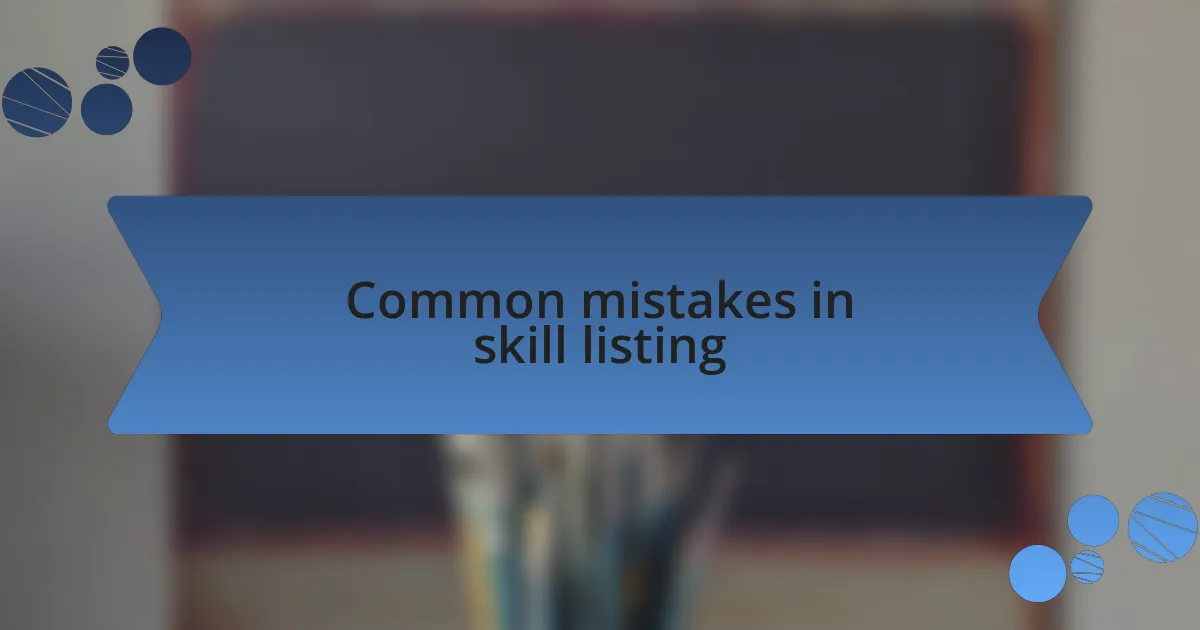
Common mistakes in skill listing
One common mistake I’ve noticed in skill listing is being overly generic. I remember a time when I simply wrote “leadership skills” without elaboration. It felt safe, but in reality, it didn’t convey any meaningful context to potential employers. Have you ever thought about how the right details can portray your leadership style more vividly? By sharing a specific example, like leading a volunteer team on a project, you can create a narrative that resonates much more.
Another frequent oversight is failing to update your skills list regularly. It seems simple, but I’ve learned the hard way that not reflecting the most relevant skills can hurt your chances. For instance, I once applied for a position with outdated software skills listed, thinking they were sufficient. The job market changes quickly—are you keeping pace with the evolving demands?
Lastly, many people overlook the importance of formatting and clarity. I once had a fellow student whose skills were hidden in a long, bulleted list without any organization. It took me forever to find the key points! When I began keeping my skills structured in categories—like technical skills and soft skills—I noticed how easily my qualifications stood out. How clear are your skill listings? A little organization can make a huge difference.